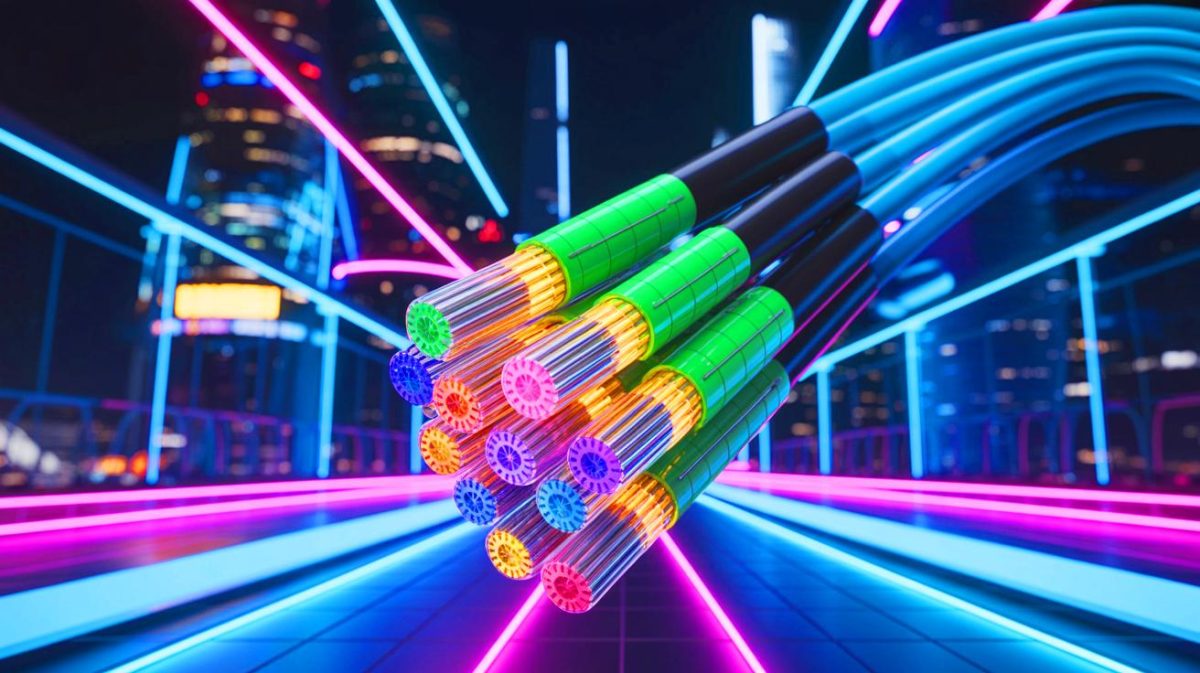| IN A NUTSHELL |
|
In a groundbreaking achievement, a team of Japanese researchers has set a new data transmission speed record, potentially revolutionizing telecommunications. This extraordinary leap could drastically change how we interact with digital technologies. The research, conducted by the National Institute of Information and Communications Technology (NICT), achieved a staggering transmission speed of 1.02 petabits per second. Such a rate would allow an entire Netflix library to be downloaded in just one second, showcasing the potential for transformative shifts in data usage and internet infrastructure.
The Technological Evolution in Fiber Optics
The cornerstone of this achievement lies in a special type of fiber that allows for an unprecedented multiplication of transmission channels. This innovative architecture enhances capacity without increasing the physical bulk of the cables. The process relies on wavelength-division multiplexing, a technique that uses different colors of light to carry data.
Over 800 channels were combined, maximizing throughput while minimizing energy loss. This remarkable performance was validated over a distance of 1,800 kilometers, demonstrating its feasibility for long-distance applications. Unlike previous records, this technology is designed to be compatible with existing network infrastructures, presenting a practical path forward for widespread implementation.
Potential Applications Across Sectors
The implications of this technological breakthrough are vast, with potential applications spanning multiple sectors. Such a data rate could enable the transfer of entire data libraries in mere seconds, providing a significant advantage to research centers and businesses engaged in massive data processing. Fields like artificial intelligence and virtual reality stand to benefit immensely from this advancement.
Data exchanges between remote servers could become nearly instantaneous, eliminating current latency constraints. Although this technology is presently reserved for professional infrastructures, it holds the promise of influencing the evolution of public networks. Future 6G standards might draw inspiration from these developments to offer unprecedented speeds to consumers.
Challenges and Considerations
While the potential benefits are immense, the path to widespread adoption of this technology is not without challenges. Integrating such high-speed data transmission into existing infrastructures will require significant investment and collaboration across industries. There is also the matter of ensuring data security at such high speeds, necessitating advancements in cybersecurity measures.
The environmental impact of deploying new fiber optic systems at this scale must also be considered. Balancing technological advancement with sustainability will be crucial to the responsible implementation of these innovations. The long-term success of this technology will depend on addressing these challenges while continuing to push the boundaries of what is possible in telecommunications.
The Future of Telecommunications
This record-breaking achievement marks a significant milestone in the evolution of telecommunications. As researchers continue to refine and expand upon these technologies, the future of data transmission looks increasingly promising. The ability to transfer massive amounts of data at unprecedented speeds could redefine how we connect, communicate, and conduct business.
As the world becomes more interconnected, the demand for faster, more reliable internet will only grow. This breakthrough offers a glimpse into what the future could hold, with the potential to reshape industries and enhance global connectivity. How will societies and industries adapt to harness the full potential of these technological advancements?
Did you like it? 4.6/5 (24)







Wow, télécharger toute la bibliothèque Netflix en une seconde ?! Je voudrais bien voir ça ! 😂
C’est incroyable, mais est-ce vraiment nécessaire pour le consommateur moyen ? 🤔
Merci aux chercheurs pour ce développement impressionnant ! Espérons que ça arrive bientôt dans nos foyers.
1.02 péta-quoi ? J’ai du mal à suivre tous ces nouveaux termes techniques. 😅
Je me demande combien ça coûterait d’avoir une telle connexion à la maison…
Une belle avancée technologique, mais qu’en est-il des impacts environnementaux ?
Les cyberattaques vont sûrement devenir plus rapides aussi… 😬
Est-ce que ça signifie que la 5G sera obsolète avant même qu’elle ne soit généralisée ?
Quelqu’un a une idée de quand cette technologie pourrait être disponible au grand public ?